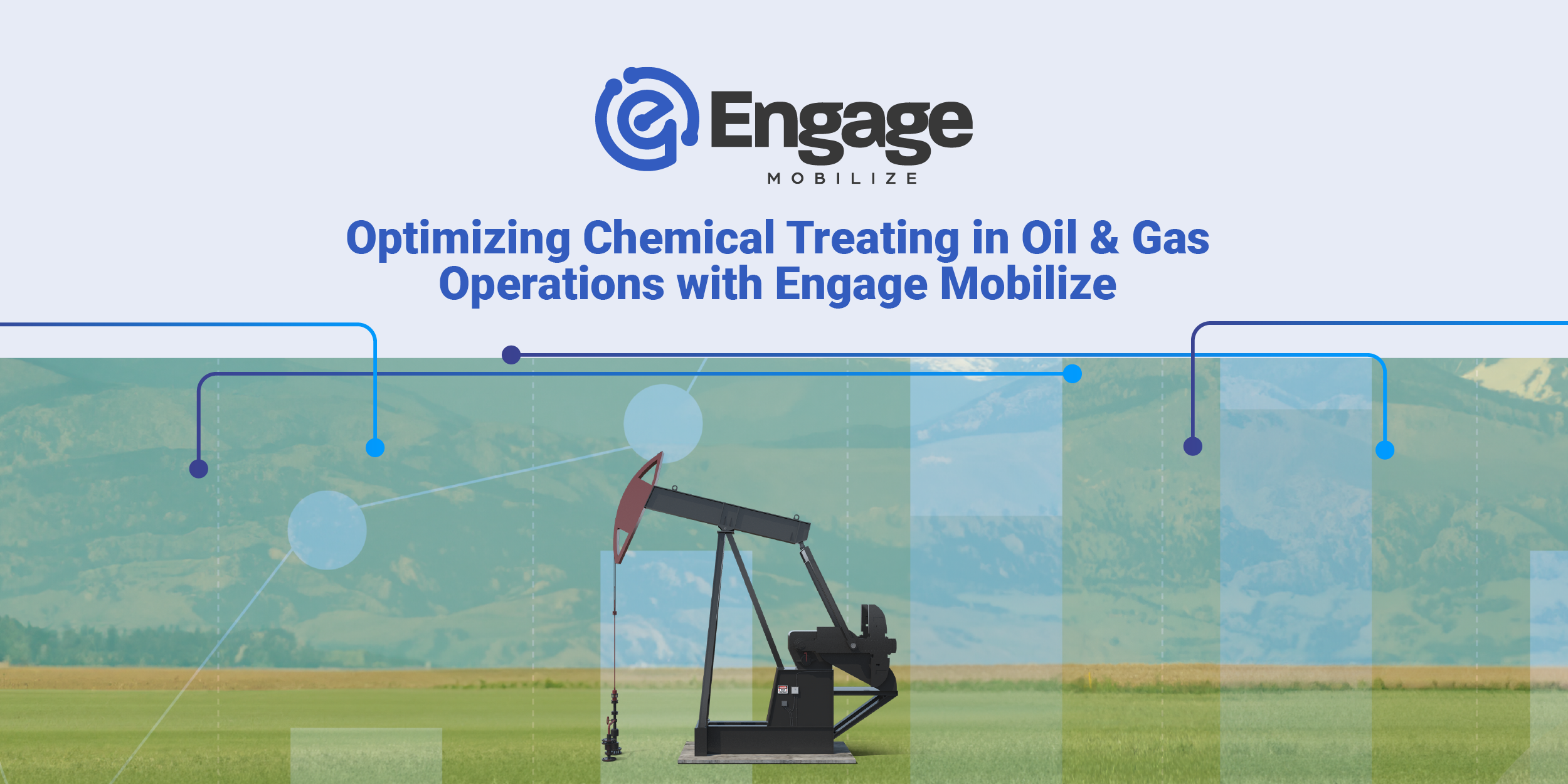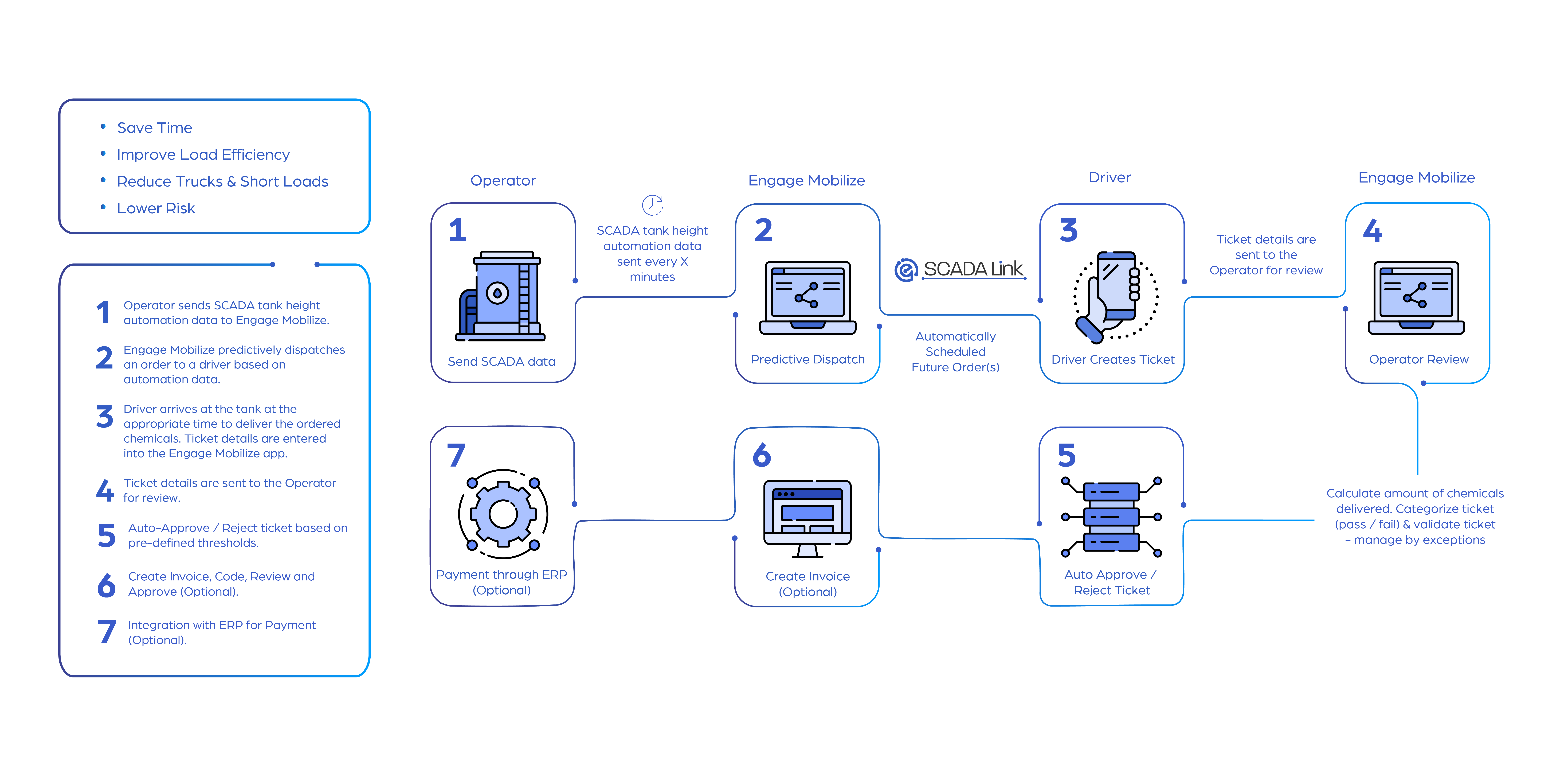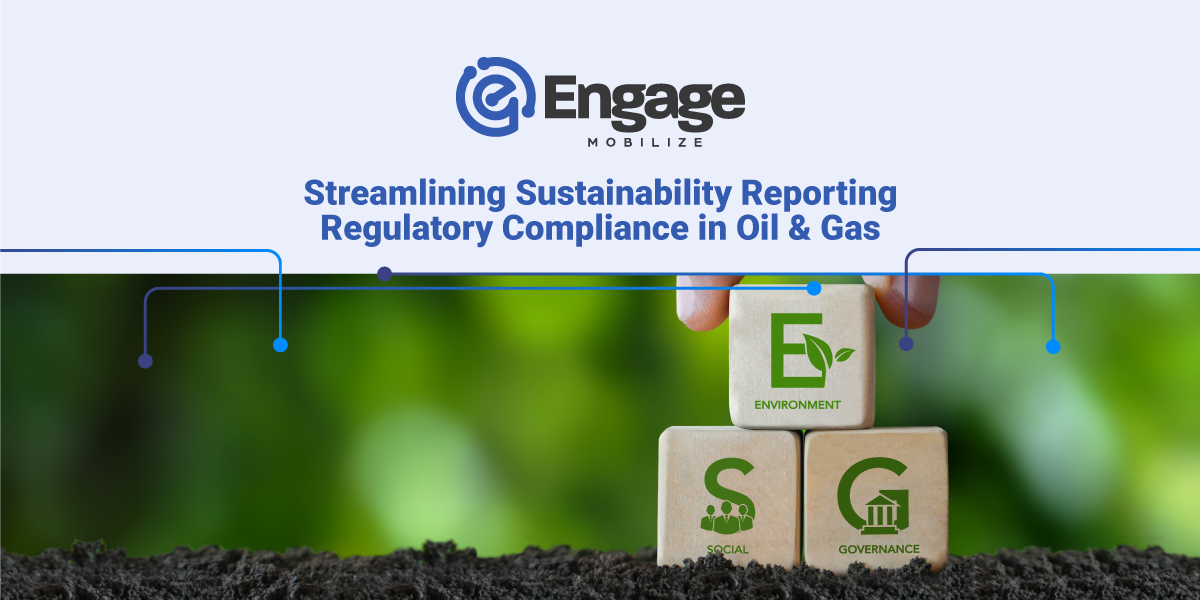Chemical Inventory Management for Oil & Gas Operations with Engage Mobilize

Optimizing Chemical Treating in Oil & Gas Operations with Engage Mobilize
Oil and gas production operations involve complex processes, and one crucial aspect of production enhancement and equipment maintenance is the routine use of chemicals. Chemical injection is a common practice where specific solutions are introduced into critical points of the production process, including the well bore, the production stream itself and even equipment (e.g., crude storage tanks) to improve the quality, flow rate and overall efficiency of primary fluids like crude oil or water.
Chemical treatment is essential in preventing hydrates, wax, asphaltenes, and scale deposition to mitigate corrosion caused by water, bacteria, and acids in the production stream.
In this article, we explore how Intelligent Field Operations Software from Engage Mobilize can help Oil and gas operators optimize the management of chemical treatments, keeping Lease Operating Expense (LOE) low and maximizing production.
Types of Production Chemicals
Before delving into the challenges and solutions, we briefly cover the most common types of production chemicals used in oil and gas production:
- Scale Inhibitors: Prevent the formation of scale deposits in pipelines and equipment, ensuring fluids can flow smoothly and efficiently through the wellbore and pipes.
- Corrosion Inhibitors: Protect metal surfaces from corrosion.
- Oxygen Scavengers: Remove oxygen from the production stream to prevent corrosion of pipelines and other infrastructure and potentially inhibit the growth of microorganisms, assuring the flow of oil and natural gas through pipes and equipment.
- Biocides: Control the growth of bacteria in the production fluids, both downhole and in surface equipment, to prevent sludge and biofouling in produced water tanks, pipelines and crude storage tanks.
- Emulsion Breakers: Separate oil and water emulsions for easier processing to improve the efficiency of surface production equipment.
- Antifoam Agents: Prevent foaming in production processes to prevent damage to production equipment and infrastructure.
- Hydrate Inhibitors: Prevent the formation of gas hydrates within pipelines and equipment in cold and freezing conditions that cause blockages and flow restrictions.
- Hydrogen Sulfide (H2S) Scavengers: Remove hydrogen sulfide to prevent corrosion and health hazards.
- Paraffin Control Agents: Prevent wax and paraffin buildup to prevent wax deposition that can impair equipment and make it difficult and/or expensive to transport from the well site to market.
- Asphaltene Control Agents: Address asphaltenes that can lead to blockages and equipment failure.
5 Common Issues in Chemical Treating
Effective chemical treatment is vital for efficient production operations but comes with several challenges. Here are the 5 most common issues:
1. Monitoring and Control. Accurate monitoring and control of chemical treatments are essential to ensure their effectiveness and prevent unintended consequences. Failure to use the appropriate volume of chemicals can render them ineffective, while over-treatment can lead to suboptimal results or even harm to equipment and personnel.
2. Data Management. Managing data related to chemical usage, effectiveness and compliance can be complex. Proper data management and timely data availability are vital for tracking performance and meeting reporting requirements.
3. Chemical Supply and Logistics. Ensuring a consistent and reliable supply of chemicals can be challenging. Buying too much due to over-treating unnecessarily increases costs, while not having an adequate inventory on hand can result in downtime or production problems. Logistics and transportation issues can impact production schedules and increase costs.
4. Regulatory Compliance. Oil and gas companies must adhere to strict regulations governing the use, handling and disposal of chemicals. Non-compliance can result in fines, legal action and damage to a company's reputation.
5. Cost Considerations. The purchase and management of chemical inventories can be expensive. Companies must carefully consider the cost-effectiveness of chemical treatments in relation to the potential benefits in production optimization.
How Engage Mobilize Optimizes Chemical Treating
Engage Mobilize offers Intelligent Field Operations Software that streamlines and optimizes the management of chemical treatment in oil and gas production.
Here's how it works:
1. Operator's SCADA System Sends Data: Real-time data from the operator's SCADA (Supervisory Control and Data Acquisition) system is transmitted to Engage Mobilize.
2. Predictive Dispatch: Engage Mobilize uses predictive algorithms to dispatch chemical treatments. It can automatically approve or reject requests based on predefined criteria.
3. Driver Creates a Ticket: When drivers need to deliver chemicals, they create a ticket with the necessary details. This ticket is sent to the operator for review.
4. Review Ticket: The operator reviews the ticket and can auto-approve or reject it based on real-time data and compliance requirements. Automatic approvals and rejections can be configured based on business rules, real-time data or compliance requirements.
5. Create Invoice (Optional): Engage Mobilize can automate invoicing if needed.
6. Payment via ERP System (Optional): Payments can be seamlessly integrated into the company's ERP (Enterprise Resource Planning) system for efficiency.

Benefits of Using Engage Mobilize for Oil & Gas Chemical Management
Using Engage Mobilize for chemical treating management in oil and gas operations generates several benefits:
- Reduce Chemical Usage and Over-Treating: Optimized chemical delivery and monitoring help reduce unnecessary chemical usage, lowering costs.
- Decrease Variance of Target Chemical Treatment Volumes: Precise control ensures that treatment volumes are consistent, timely and meet operational goals.
- Gain Visibility into Treatment and inventory: See hourly and daily reorders from the last service and schedule treatments directly to vendors.
- Analytics: Access to real-time data and analytics enables better decision-making for chemical treatments.
- Save Time: Streamlined digital processes and automation save time for both operators and vendors with electronic tickets and digital workflows to eliminate inefficient manual processes vulnerable to human error.
- Improve Load Efficiency: Optimized dispatching reduces the number of vehicles, short loads and associated Scope 3 emissions.
- Compliance: Ensure compliance with regulatory requirements, avoiding fines and legal issues.
- Data for Analytics: Gather valuable data for long-term analysis and continuous improvement.
Summary
Efficient and accurate chemical treating is critical to efficient and cost-effective production operations and maximizing uptime, but comes with challenges related to monitoring, data management, logistics, compliance and cost. Engage Mobilize's Intelligent Field Operations Software offers a comprehensive solution to optimize the management of chemical acquisition, transport and treating for reducing costs and maximizing efficiency.
Contact us today at (720) 575-6695 or Sales@engage-m.com to learn how Intelligent Field Operations Software from Engage Mobilize can help you optimize your chemical treatment program and achieve new levels of operational efficiency.
Are you ready to learn more?
We’re ready to talk to you about the specific cost savings, workflow efficiencies and data insights that come from taking your field operations digital.
Share this
Similar Stories

Boosting Productivity and Efficiency in Upstream Oil & Gas with Intelligent Field Ticket Software from Engage Mobilize

Integrating Field Operations Software: Unifying Your Systems into One Integrated Solution


